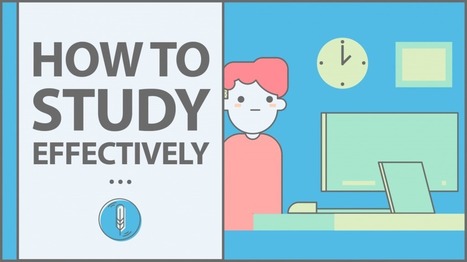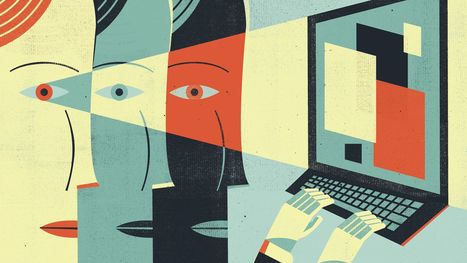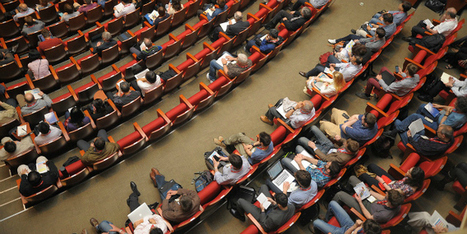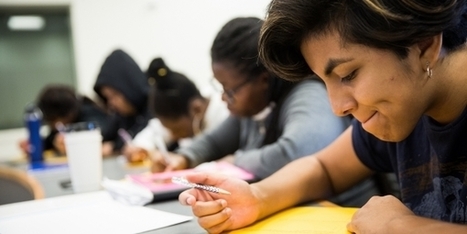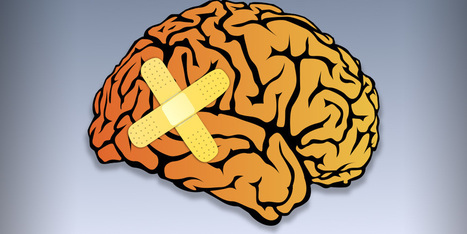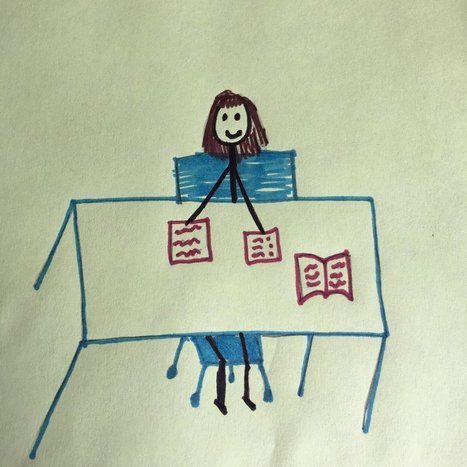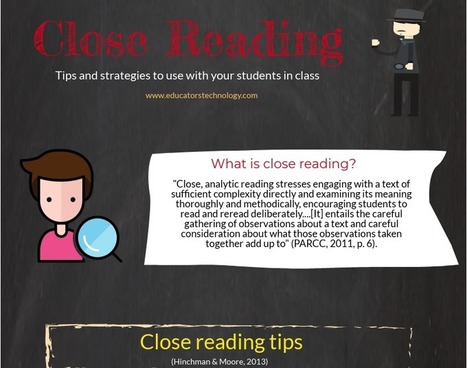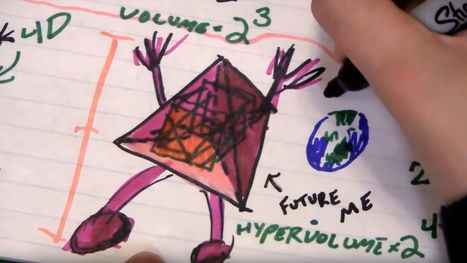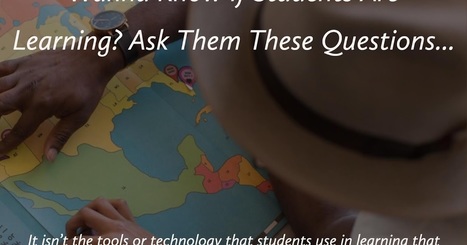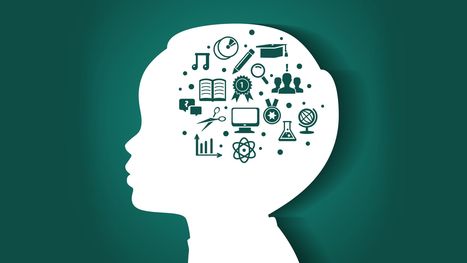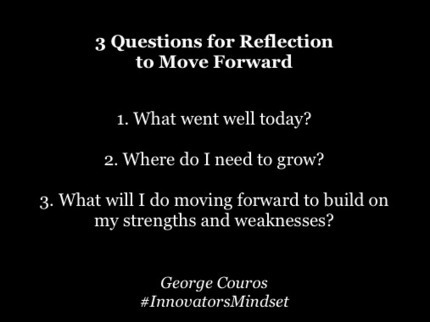 Your new post is loading...
 Your new post is loading...
After winning the Nobel Prize, physicist Max Planck "went around Germany giving the same standard lecture on the new quantum mechanics. Over time, his chauffeur memorized the lecture and said, 'Would you mind, Professor Planck, because it’s so boring to stay in our routine, if I gave the lecture in Munich and you just sat in front wearing my chauffeur’s hat?' Planck said, 'Why not?' And the chauffeur got up and gave this long lecture on quantum mechanics. After which a physics professor stood up and asked a perfectly ghastly question. The speaker said, 'Well, I’m surprised that in an advanced city like Munich I get such an elementary question. I’m going to ask my chauffeur to reply.'""
Analysis rhymes with paralysis, I have discovered: Too often in the past, the texts I asked my freshman English students to analyze left them frozen, detached from their own thoughts and feelings. They scratched at the surface of literature that was not particularly meaningful or accessible to them. The result was cold, inauthentic writing, and I dreaded teaching analysis. But last summer I read Allison Marchetti and Rebekah O'Dell’s book Beyond Literary Analysis and decided to use their approach. Marchetti and O’Dell uncouple the task of analysis from traditional literary texts and instead invite students to delve into a broader definition of text: “anything that has a beginning, middle, and end and can be broken down into smaller pieces and studied.”
Going to an academic conference is an exciting opportunity to connect with like-minded individuals and exchange stimulating ideas. However, to make the most of a conference requires a lot of hard work before, during, and after the meeting itself. Marta Teperek provides a checklist of things to do at each of these stag
For First-Generation Students, Studying Effectively Doesn’t Always Come Naturally. Instructors Can Help Gail Horowitz noticed something peculiar about the first-generation students who were struggling in her chemistry classes. They studied as hard as their classmates. So why weren’t they doing as well? That question led Horowitz, then a lecturer of chemistry at City University of New York Brooklyn College, to explore the challenges facing students who are the first in their families to go to college. They had drive and determination, she learned, but often lacked the skills needed to do well in rigorous courses.
Jane Lydon on Twitter: "I love this guide for checking articles before submission: and I never thought about the politics of citation like this before! https://t.co/QRAbsfHrAd Thanks @prof_mirya Ha...
In positive psychology, ‘flow’ is a term used to describe the optimal state of consciousness. It’s in this state that we become so energised and absorbed by what we’re doing that all distractions fade into the background and the hours seem to fly by.
At one time or another we have all engaged in poor thinking habits. After all, nobody’s perfect and neither is anybody’s thinking. However, that doesn’t mean we can’t get better at it and start thinking more critically. It’s worth our time to seek ways of improving our thinking and to guide our learners to do the same. Poor thinking habits refer to the ways of thinking that produce adverse effects in every part of our lives. They can negatively affect our personal progress, our relationships, and everyone around us. But they do much more than that, actually. Not only do they affect the outside world, but they do damage from within as well. In the long run poor thinking can affect our self-esteem, our ability to cope with challenges, and even our physical health.
At the University of Texas at Austin, linguistic researchers have found that we recall information from conversations better when we’ve been listening to someone who speaks clearly, as it frees up cognitive resources which would otherwise be used to decipher the words themselves rather than the meaning behind them. These findings have promising implications for the classroom.
“Somewhere we know that without silence words lose their meaning, that without listening speaking no longer heals, that without distance closeness cannot cure.” —Henri Nouwen
As an educator, I hope that students gain the confidence to express themselves and the strength to ask for help. At their age, students can sometimes struggle to find their voices and hear those of others.
While students may be engaged in class and making visible, positive progress, they may still feel at a loss when it comes to preparing for exams and final assessments. Teachers can give them plenty of tips and advice but when one is on their own, that's when the doubts and questions often take over.
How to write an essay
This is a lecture aimed at first-year undergraduates, on basic essay-writing skills. It's public and re-usable so feel free to download and adapt. If you do find it useful, do leave me a comment!
The purpose of today’s post is to give students a resource to help them take charge of their own learning. We’re going to do a series of these over the next few weeks; today’s post is about retrieval practice – a useful method for studying any material that you’d like to remember in the future.
What is retrieval practice?
Think about a book you read last year. How much of it do you remember? Could you list ten things you learned from it? Can you even remember what books you read last year? Back in school, you actually had to remember what you’d read. Tests, term papers, and book reports were all just ways to help you retain that information. So engineer Robert Heaton invented a three-step system for reading a book like a student. (And if you are a student, it might be better than your current habits.)
|
Close reading is an essential survival skill specially now that we live in a data-saturated world where we are constantly bombarded by all forms of textual and non-textual stimuli. At its core, close reading is a metacognitive practice that allows you to achieve a deeper understanding of complex texts. It is a methodically analytical process that aims at deconstructing both the surface and deeper meanings of a text through a close analysis of its language. Close readers pay attention to syntax, lexicon and linguistic cues that can help uncover the implicit import of a textual output.
Academic writing is a difficult and creative undertaking and advice to authors can often be to follow a single method or to copy the approaches of other academics. In this post Chris Smith draws on his years of experience working as an academic writing coach, to provide 10 counter-intuitive insights to help you understand and improve your own writing practice.
As a writing coach I sometimes find myself giving the same pointers and tips again and again. Over the years, I’ve grown accustomed to the raised eyebrows these tips can generate. They seem unconventional and counter intuitive. They’re often not received academic wisdom.
Mobile devices and other digital tools reshape how college students get classwork done. Meghan is an associate editor with EdTech. She enjoys coffee, cats and science fiction TV. When it comes to studying, today’s students aren’t hunkering down in libraries all night to prepare for big exams. Instead, they’re tucked safely in their dorms with a laptop or mobile device. A recent survey from McGraw-Hill Education found that 74 percent of students prefer to study at home, while only 14 percent indicate they prefer the library, probably because of the technology available to them at their homes.
- Bill Gates, Mark Zuckerberg, and Ellen DeGeneres all dropped out of college, yet they became leaders in their fields. Their secret? Self-directed learning.
- Self-directed learning can help people expand their knowledge, gain new skills, and improve upon their liberal education.
- Following habits like Benjamin Franklin's five-hour rule, the 80/20 rule, and SMART goals can help self-directed learners succeed in their pursuits.
It’s long been known that drawing something helps a person remember it. A new study shows that drawing is superior to activities such as reading or writing because it forces the person to process information in multiple ways: visually, kinesthetically, and semantically. Across a series of experiments, researchers found drawing information to be a powerful way to boost memory, increasing recall by nearly double.
It can be a struggle to best help students understand what they are learning or for students to articulate their learning in meaningful ways. This was especially difficult for me starting out in on my teaching journey. Based on how I had been taught to be an educator the best ways to know if students are learning was to give them a test. If they failed, it was their fault and they needed to do better next time. It took me a long time to learn that in the process of learning the teacher and the student need to be partners.
When presented with new material, standards, and complicated topics, we need to be focused and calm as we approach our assignments. We can use brain breaks and focused-attention practices to positively impact our emotional states and learning. They refocus our neural circuitry with either stimulating or quieting practices that generate increased activity in the prefrontal cortex, where problem solving and emotional regulation occur.
“Student Voice” is something that many schools are focusing on and for a good reason. If we, as educators, understand that we serve our students and not the other way around, getting their thought and feedback for not only problems but solutions in moving our schools forward, is crucial. From my experience though, I have seen a lot of money, time, and effort, in getting thoughts and feedback from students, listening to their voice, and then often, no action based on what they have shared. Dean Shareski wrote a challenging post on this and shared the following thoughts on “Student Voice”:
I broke a rowing machine yesterday at the gym. I don't know my own strength. Ironically, that's the very reason I attend the gym regularly. I want to know my own strength. I want to know what my limits are, and then try to exceed them. Apart from breaking the rowing machine, my fitness regime is going swimmingly (without the swimming, obvs). I have learnt a lot. I know about cross trainers, treadmills and weights. I thought a Dip Assist was someone telling me where to stick my Doritos*, until I discovered the weights area. And it was while I was working out at the gym this morning that this thought came to me: To know your own strengths, it's often wise to compete against yourself rather than anyone else.
According to the recently published Natwest Student Living Index, 64% of university students rated the stress of studying for their degree as seven or above out of ten. Other studies have estimated that up to 82% of UK university students suffer from stress and anxiety, and the number of students dropping out of university due to mental health problems is increasing.
When Linda Eunson started her online degree in psychology at the Open University, she didn’t expect it to take eight years to complete.
“During that time I have moved house four times, changed jobs once, and got married,” the 47-year-old explains. The death of her teenage stepson soon after her own mother’s death also meant she was forced to suspend her studies for a year.
Here at Techboomers, we are always advocating for adult online learning. We believe it is never too late to start learning new skills, especially when it comes to online education. Because of modern technology, it’s entirely possible to learn about almost any topic online. You can work at your own pace, from the comfort of your own home, and keep working on gaining the skills you want to acquire to help you achieve goals in your life.
|

 Your new post is loading...
Your new post is loading...
 Your new post is loading...
Your new post is loading...




